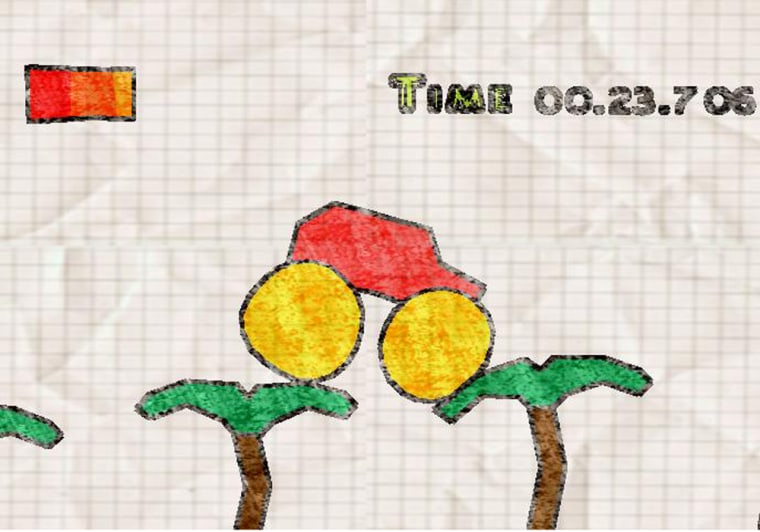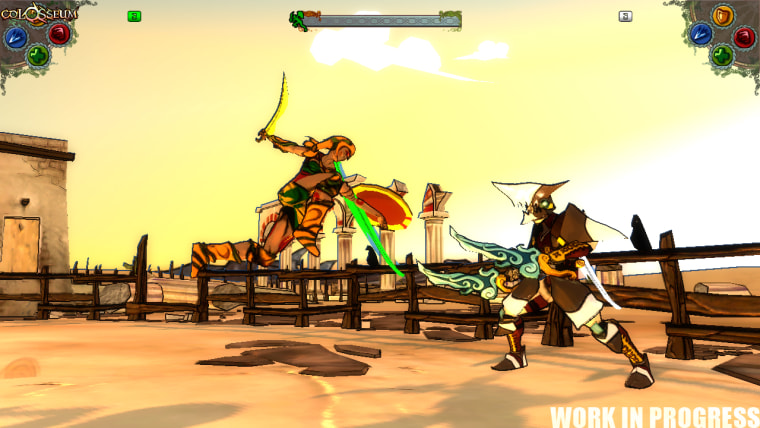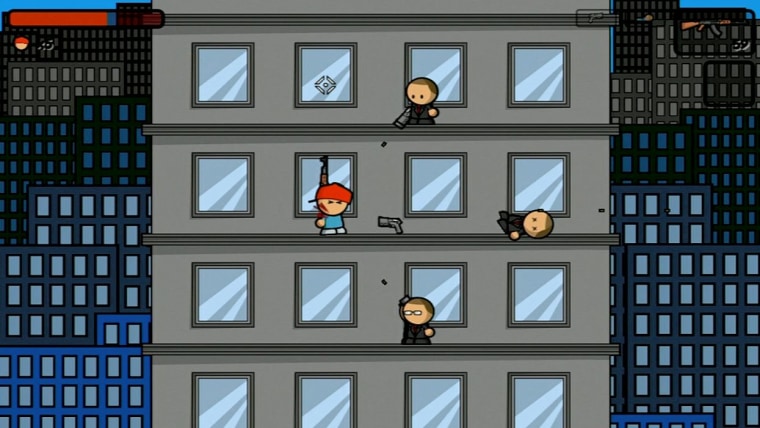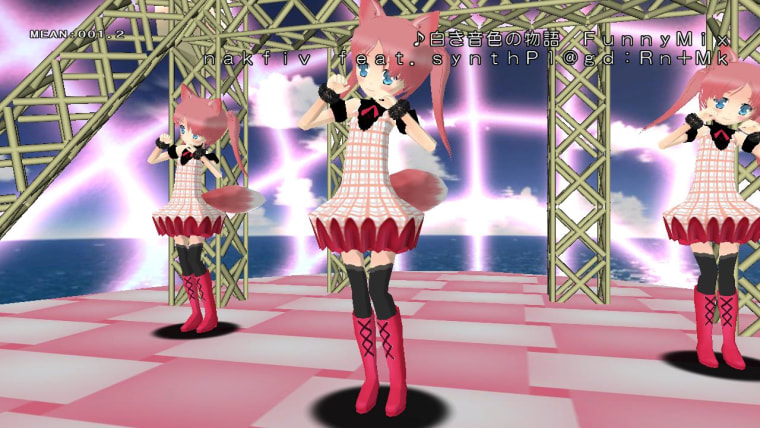I’m not sure what to make of “FunnyDancing.”
Cue up this Xbox 360 game and you’re greeted with this: “Welcome to the world of the funny dancing. FunnyDancing is free dance action.”
Free dance action, eh? The mind reels with the possibilities.
But play the game, and you quickly discover that “free dance action” means you’ll find three girls drawn in cutesy Japanese anime style — complete with fox ears and fox tails — standing on a stage. As the player, it’s your job to press the Xbox controller’s four buttons, each of which makes the girls perform a different herky-jerky dance move while incessantly cheery electronic music plays incessantly in the background.
And that’s pretty much it.
Seriously. That’s the entire game: Press buttons, make fox girls dance, end of story. You don’t have to push the buttons in any particular order. You don’t have to push the buttons to the beat of the music. Heck, you don’t even score points.
Speaking of points … what is the point, you might ask.
Democracy, baby. That’s the point.
“FunnyDancing” is just one of the potentially hundreds of games that will begin to roll out sometime this holiday season as part of Microsoft’s new Community Games service — a service that’s meant to empower homebrew and hobbyist game makers, students and independent spirits alike to tap into their creative mojo and make games for the whole world to play (or at least that portion of the world that owns an Xbox 360).
(Msnbc is a joint Microsoft – NBC Universal venture.)
Community Games works like this: Just about anybody who’s ever thought “By golly, I could make a video game” (and has some programming skills to back up that fantasy) can download Microsoft’s XNA Game Studio development tools for free and use them to make a game. Then, for an annual fee of $100, they can join the XNA Creator’s Club, where they post their games to be reviewed by fellow Community Games developers.

During this peer-review process, each game is rated on its level of violence, sex and mature themes; is checked for objectionable content (read: some blood and gore is okey-dokey but content that’s racist, hateful, or pornographic, not so much); and is scoured for bugs and other problems. If it passes muster, creators can post their game to Xbox Live, where any Xbox owner can buy the game and download it to their machine.
Microsoft pitches Community Games as a bold move toward the “democratization” of game development and distribution. That is, they have removed the skyscraper-tall hurdles that have traditionally stood in the way of making games for a console. No more big companies deciding what makes for a good game. No more corporate bean-counters telling would-be developers what kind of game is likely to be profitable enough to put in front of the public. The masses get to make the games and the masses get to decide what games they want to play.
But what kind of games do you get when anyone can make a video game?
Gaming by the people, for the people
Well, for starters, you get “GravSheep,” a game in which players are asked to maneuver a jet-powered dog through space, rounding up floating space sheep. You heard me right: Space sheep.
Microsoft allowed me a sneak peak at the games brewing during the recent Community Games beta. There I found 82 games in various states of completion – games like “Ka-Ado the Cloud,” a game in which you help a puffy cloud navigate the tall buildings of a city, and “Pastry Wars,” a game in which you shoot down evil pies, cakes and cookies (think “Space Invaders” … in the kitchen). There’s also “Head Banger” — a rhythm game in which you help a faceless rock fan bang his head to the beat of the music.
After checking out the games made by-the-people-for-the-people, I’d like to offer up a new Community Games slogan: Welcome to the world of the Xbox Live Community Games. Community gaming is wacky game action.
And that’s a good thing, says Boyd Multerer, general manager of XNA. “When I look at the professional industry, there’s so much money at stake when they make a game that there’s less risk-taking. This is a space where, if somebody has a goofy idea, they can put it out there and prove that they’re right, or find out that they’re wrong.”

Of course, when there’s no big game publisher with deep game-publisher pockets and vast game-making know-how to guide the way, average joes coding in their dorm rooms and living rooms sometimes end up creating not only some seriously goofy games but some … eh ... rough games as well.
The characters in “Doodleman,” for example, are exactly that — nothing more than stick figures. The music that plays during the game is a guy singing “dum, dum, da dum, dum” over and over again. Meanwhile, there’s “Catapult” — a game in which you do nothing more than send pumpkins sailing through the air with a poorly animated digital catapult.
Graphics that look like they were hand-drawn by middle schoolers, gameplay as shallow as a toddler’s wading pool ... sometimes democracy isn’t especially pretty to behold. I checked out 29 of the community games in the beta and, of those, I’d say maybe seven were worth paying actual money for.
And these games will actually cost money. Creators must sell their games for 200, 400 or 800 Microsoft Points (that's $2.50 to $10 per game, of which the developers typically will get to keep 70 percent and Microsoft will take 30 percent.)
Multerer says he’ll be happy if they launch Community Games with a handful of standout games.
“This is what you get when you open it up to everybody,” Multerer says. “Some of the people are still learning how to write a video game and what you’re seeing is effectively an experiment.” But he points out, “That’s how people learn and that’s how the community gets better.”
He also points out that all Community Games will come with a free demo so players can try a game before they buy it.
Grand creative experiment
And for all the stick figure graphics and sheep herding in space, I can see that this is going to be a truly grand creative experiment.
For starters, there are some genuinely good games already popping up on the service. “Little Gamers” (based on the Web comic of the same name) is a bloody, funny, side-scrolling brawler that finds child-like characters merrily hacking each other to bits with all manner of weaponry. The 3-D fighting game “Colosseum” delivers some intense yet intuitive fighting action with some seriously stylish visuals.
Meanwhile, “City Rain” — an environmentally conscious cross between “Tetris” and a city simulation game — is genuinely addictive and one of the better educational games I’ve played. And “JellyCar” is a fabulously creative physics game that puts drivers in control of a gelatinous vehicle that must be maneuvered through various environmental puzzles. The game's child-like, hand-drawn graphics only add to its charm.
Even when the games don’t quite qualify as “good,” it’s clear that — given the tools to try anything — game developers are coming up with some very interesting ideas. “World Molder,” for instance, is ugly as heck with its amateurish graphics, but an intriguing concept sits at its core — you have to manipulate the landscape almost as if it were clay to make your way past various puzzles.

Multerer points out that the games I saw in the beta are just a rough peek of what’s to come this holiday season — games that are still being worked on from game developers who are still learning the ropes. But what the launch will hold, he can only guess. Microsoft is taking a hands-off approach — leaving it up to the game makers to make of their games what they will.
And so you never know, with a bit of work and polish, perhaps “FunnyDancing” will become the next “Rock Band.” After all, if there’s one thing democracy has taught us, it’s that you should never underestimate the power of the people.
